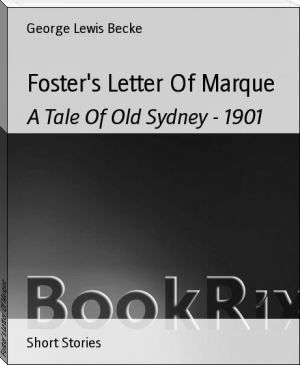Foster's Letter Of Marque - George Lewis Becke (english novels to read TXT) 📗

- Author: George Lewis Becke
Book online «Foster's Letter Of Marque - George Lewis Becke (english novels to read TXT) 📗». Author George Lewis Becke
I
One by one the riding-lights of the few store-ships and whalers lying in Sydney Harbour on an evening in January, 1802, were lit, and as the clear notes of a bugle from the barracks pealed over the bay, followed by the hoarse calls and shrill whistles of the boatswains' mates on a frigate that lay in Sydney Cove, the mate of the _Policy_ whaler jumped up from the skylight where he had been lying smoking, and began to pace the deck.
The _Policy_ was anchored between the Cove and Pinchgut, ready for sea. The north-easter, which for three days had blown strongly, had now died away, and the placid waters of the harbour shimmered under the starlight of an almost cloudless sky. As the old mate tramped to and fro on the deserted poop, his keen seaman's eye caught sight of some faint grey clouds rising low down in the westward--signs of a south-easterly coming before the morning.
Stepping to the break of the poop, the officer hailed the look-out forward, and asked if he could see the captain's boat coming.
"No, sir," the man replied. "I did see a boat a while ago, and thought it was ours, but it turned out to be one from that Batavian Dutchman anchored below Pinchgut. Her captain always goes ashore about this time."
Swinging round on his heel with an angry exclamation, the mate resumed his walk, muttering and growling to himself as elderly mates do mutter and growl when a captain promises to be on board at five in the afternoon and is not in evidence at half-past seven. Perhaps, too, the knowledge of the particular cause of the captain's delay somewhat added to his chief officer's ill-temper--that cause being a pretty girl; for the mate was a crusty old bachelor, and had but little sympathy with such "tomfoolery."
"Why the devil couldn't he say goodbye to her and be done with it and come aboard," he grumbled, "instead of wasting half a day over it?"
But Mr. Stevenson did not consider that in those days pretty women were not plentiful in Sydney, and virtue was even scarcer than good looks, and Dorothy Gilbert, only daughter of the Deputy Acting Assistant Commissary-General of the penal settlement, possessed all the qualifications of a lovable woman, and therefore it was not wonderful that Captain Charles Foster had fallen very much in love with her.
Dorothy, of course, had her faults, and her chief one was the rather too great store she set upon being the daughter of an official. Pretty nearly every one in those days of the settlement was either an official or a prisoner or an ex-convict, and the D.A.A.C.G. was of no small importance among the other officials in Sydney. The girl's acquaintance with the young master of the _Policy_ began in a very ordinary manner. His ship had been chartered by the Government to take out a cargo of stores to the settlement, and the owners, who were personally acquainted with her father, had given Foster a letter of introduction. This he had used somewhat sooner than he had at first intended, for on presenting himself at the Commissary's office he had caught sight of Dolly's charming face as she stood talking to a young man in the uniform of a sergeant of the New South Wales Regiment who had brought a letter to her father. .
"Thank you, Sergeant," the young lady said with a gracious smile. "Will you present my father's compliments to the Major and say we shall be sure to come. He is not here at present, but cannot delay long, as he will have much business to transact with the master of the ship just come in, and who will doubtless be here very soon."
Just at that moment Foster appeared at the open door, and the young lady, divining at once that he was the person of whom she had just spoken, bowed very prettily, and begging him to be seated whilst she had search made for her father, left the office and disappeared in the living portion of the house, followed by a look of very great interest from Captain Foster. A minute later the Commissary entered the room, and Foster was soon deep in business with Dolly's father, to whom he made himself very agreeable--having a certain object in view.
Their business concluded, the young man rose to go, and not till then--being wise in his generation--did he allude to the fact of his having a private letter of introduction from his owners--Messrs. Hurry Brothers, of London--to Mr. Scars-brook. The stiff, official manner of the D.A.A.C.G. at once thawed, and being at heart a genial old fellow, he expressed his pleasure, shook hands again with the young man, and inquired why he had not presented the letter or made allusion to it before.
Foster, who had pretty well gauged Mr. Scarsbrook mentally, modestly replied that he did not care to obtrude private affairs at an inopportune time. He knew that weighty affairs doubtless occupied Mr. Scarsbrook's mind during his business hours, but had intended to do himself the honour of presenting his letter later on, &c.
This at once impressed the D.A.A.C.G., who asked him to dinner that evening.
"A most intelligent young man, my dear," he told Dolly shortly after. "His attention to business before all else has given me a very favourable impression of him."
Dolly tossed her head. "I hope I shall not be disappointed in him. Is he young?" she asked indifferently.
"Quite; and in manners and appearance much above his position."
Dolly did like him very much--'much more than she cared to confess to herself--and their first meeting at dinner led to many of a less formal character, and ere a week had passed Captain Charles Foster was very much in love with his host's daughter, and not being a man who wasted time, was only awaiting an opportunity to tell her so.
Now Dolly, who had first flirted with and then flouted every one of the bachelor officials in Sydney, military or civilian, who visited the Commissary's abode, was, to do her justice, a girl of sense at heart, and she felt that Captain Foster meant to ask her an all-important question--to every woman--and that her answer would be "Yes." For not only was he young, handsome, and highly thought of by his owners, but he came of a good family, and had such prospects for his future as seldom came in the way of men in the merchant service even in those days of lucky South-Seamen and East India traders, who made fortunes rapidly. And then 'twas evident he was very much in love with her, and this latter fact considerably and naturally influenced her.
The first week passed pleasantly enough, then, to his anger and disgust, Foster found he had a rival; and before the end of the second week he realised, or imagined so, that he was beaten in the field of love--by a Dutchman!
Sergeant Harry Burt was the first to give him warning, for he was often on duty at or near the Commissary's quarters, and, indeed, had often taken notes from Foster to the fair Dolly. He showed a warm interest in the matter, for Foster was always polite to the sergeant, and did not turn up his nose at "soldier men," as other masters of ships were but too ready to do.
It had so happened that the work of discharging his ship had kept Foster very busy during the second week of his stay, and he had paid but one evening visit to Dolly and her father, and was hurrying the cargo ashore with feverish eagerness. Once that was accomplished, he meant to devote himself (1)to proposing to the young lady, (2) gaining her father's consent, and (3) getting to sea again as soon as possible, making a good cruise at the whale fishery, and returning to Sydney within two years as master and owner of a ship of his own. Consequently, Burt's news gave him considerable disquietude.
"Who did you say he was, Sergeant?" he asked gloomily; "a Dutchman?"
"Yes, sir; he's the master of that Dutch Batavian ship that has brought stores from Batavia. Mr. Scarsbrook seems to make a lot of him of late, and he's always coming up to the Commissary's place. And if he sees Miss Scarsbrook out in the garden he swaggers in after her as if he were an admiral of the fleet Portveldt's his name, and--and----"
"And what, Sergeant?"
"Well, I think Miss Scarsbrook rather likes him, that's all. You see, sir, you haven't been there for a week, and this young Dutchman is by no means bad-looking, and even our Major says he's a jolly fine fellow--and all that goes a long way with women, you know. Then you only visit the house once in a week; the Dutchman goes there every day, and every time he comes he brings his boatswain with him--a big, greasy-faced chap. Last night he followed his master, carrying a cheese--a present for the Commissary, I suppose."
"Well, I shall soon see how the land lies, Sergeant I'm going ashore presently, and I can promise you it won't be my fault if I let this fellow get to windward of me."
But Miss Dolly was not to be seen that day, nor yet on the following one. She was vexed at Foster having thought of his work before herself, and she had determined to punish him by not meeting him for some little time, and amuse herself with the handsome young Dutch sailor meanwhile. So, in no very amiable mood, Foster went back to his ship, finished discharging, and delighted his old mate by telling him to get ready for sea as quickly as possible. And on this particular evening when our story opens the _Policy_ only waited for her captain--who had gone ashore--so he told Stevenson--to say goodbye to the Commissary, with parting instructions to the mate to begin to heave up as soon as he saw his (Foster's) boat leave the Cove.
After spending half an hour with the Commissary, Foster asked to see Miss Dorothy, and was soon ushered into the sitting-room, where the young lady welcomed him effusively, and her manner soon drove all suspicious thoughts of his rival out of his mind. Her mother, a placid lady, who was absolutely ruled by Dolly and her father, smiled approval when Foster asked her daughter to accompany him to the garden and take a look at the harbour. She liked him, and had previously given him much assistance by getting out of the way whenever she suspected he wanted to see Dolly alone.
As soon as they had gained the screen of the shaded path leading to the water's edge, Foster came to the point at once.
"Dolly," he said, "you know why I have asked you to come with me here. My ship is ready for sea, and it may be quite two years before I shall have the happiness of seeing you again."
"'Tis very kind of you to pay me so pretty a compliment, Captain Foster--or I should say Mr. Foster," said Dolly, concealing a smile; "but surely you need not have brought me out to the garden to tell me this."
Her pretended forgetfulness of some past passages in their brief acquaintance, as her speech implied, ruffled him.
"You are very particular with your _Mr_. Foster, Miss Dolly; and why not 'Captain'?"
Dolly raised her eyebrows in surprise.





Comments (0)